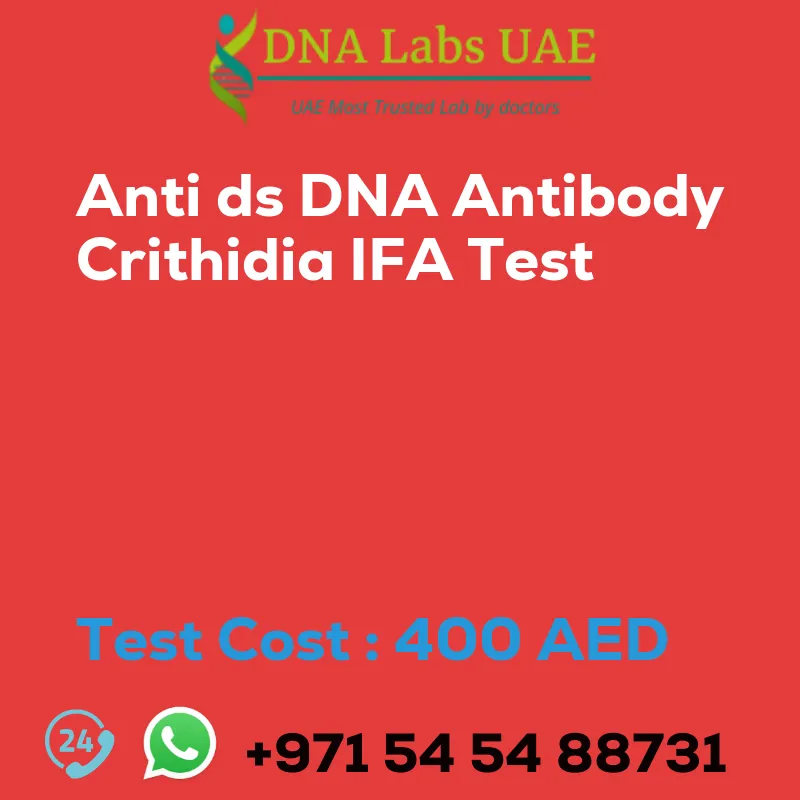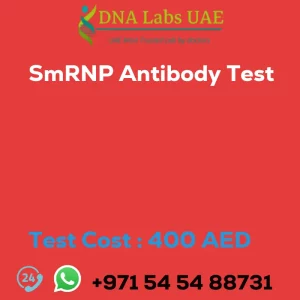Anti ds DNA Antibody Crithidia IFA Test Price 400 AED In Dubai
Introduction
Autoimmune diseases can significantly impact an individual’s quality of life, and accurate diagnostic tools are crucial for effective management and treatment. The Anti ds DNA Antibody Crithidia IFA Test is a specialized blood test used to diagnose systemic lupus erythematosus (SLE), a chronic autoimmune condition. For people in the UAE, understanding this test can aid in early detection and appropriate management of SLE.
Symptoms Indicating the Need for the Anti ds DNA Antibody Crithidia IFA Test
Systemic lupus erythematosus (SLE) presents with a variety of symptoms that can range from mild to severe. Recognizing these symptoms is essential for timely testing and diagnosis. Common symptoms of SLE include:
- Fatigue: Persistent and unexplained fatigue is a common symptom, often severe enough to interfere with daily activities.
- Joint Pain and Swelling: SLE often causes arthritis-like symptoms, with pain and swelling in the joints.
- Skin Rashes: The characteristic “butterfly” rash across the cheeks and nose is a hallmark of SLE, though other skin rashes can also occur.
- Fever: Low-grade fevers without any clear infection can be a symptom of SLE.
- Photosensitivity: Increased sensitivity to sunlight, resulting in rashes or flare-ups of other symptoms upon exposure.
- Kidney Problems: SLE can affect kidney function, leading to symptoms like swelling in the legs or high blood pressure.
- Hair Loss: Unexplained hair loss can also be associated with SLE.
- Mouth Sores: Painful sores in the mouth or nose are common in people with SLE.
Components of the Anti ds DNA Antibody Crithidia IFA Test
The Anti ds DNA Antibody Crithidia IFA Test involves several key components to ensure accurate detection and diagnosis:
- Patient Preparation: The patient should provide a detailed medical history and list any medications they are currently taking, as some drugs can affect test results.
- Blood Sample Collection: A blood sample is drawn from the patient, typically from a vein in the arm.
- Laboratory Analysis: The blood sample is sent to a specialized laboratory where it is tested using the Crithidia luciliae indirect immunofluorescence assay (IFA). This technique involves using a specific protozoan, Crithidia luciliae, as a substrate to detect the presence of anti-double-stranded DNA (anti-dsDNA) antibodies.
- Fluorescence Microscopy: The presence of anti-dsDNA antibodies is confirmed through fluorescence microscopy. If the antibodies are present, they will bind to the DNA within the Crithidia luciliae, causing fluorescence under the microscope.
Test Details
The Anti ds DNA Antibody Crithidia IFA Test is detailed and precise, providing critical information for diagnosing SLE:
- Purpose of the Test: The primary purpose of the test is to detect anti-dsDNA antibodies, which are specific to SLE. These antibodies target the DNA within the nuclei of cells, causing inflammation and tissue damage.
- Interpretation of Results:
- Positive Result: Indicates the presence of anti-dsDNA antibodies, supporting a diagnosis of SLE. The level of fluorescence can also give an indication of disease activity, with higher levels often correlating with more active disease.
- Negative Result: Suggests the absence of anti-dsDNA antibodies, which makes SLE less likely but does not rule it out entirely. Other tests may be needed to confirm the diagnosis.
- Follow-Up Testing: Depending on the results, further testing may be recommended. This can include additional autoimmune panels, kidney function tests, or imaging studies to assess the extent of organ involvement.
Importance of Early Detection
Early detection and diagnosis of SLE are crucial for effective management and treatment. The Anti ds DNA Antibody Crithidia IFA Test is a valuable tool in this process, helping healthcare providers make informed decisions about treatment strategies to manage symptoms, prevent flare-ups, and reduce the risk of long-term complications.
Test Details
The anti dsDNA antibody Crithidia IFA (Indirect Immunofluorescence Assay) test is a diagnostic test used to detect the presence of anti-double-stranded DNA (dsDNA) antibodies in the blood. These antibodies are specific to systemic lupus erythematosus (SLE), an autoimmune disease.
In this test, Crithidia luciliae, a type of protozoan, is used as a substrate to detect the antibodies. The protozoan cells are fixed on a slide and then incubated with the patient’s serum. If the patient has anti-dsDNA antibodies in their blood, these antibodies will bind to the dsDNA present in the Crithidia cells.
After incubation, the slide is washed to remove any unbound antibodies, and then a fluorescent-labeled anti-human antibody is added. This secondary antibody binds to the patient’s anti-dsDNA antibodies if they are present. The slide is then examined under a fluorescence microscope, and if fluorescence is observed in the Crithidia cells, it indicates the presence of anti-dsDNA antibodies.
The Crithidia IFA test is considered a sensitive and specific test for detecting anti-dsDNA antibodies and is often used as a confirmatory test for SLE. However, it should be used in conjunction with other clinical and laboratory findings to make a definitive diagnosis of SLE.
Conclusion
The Anti ds DNA Antibody Crithidia IFA Test is a specialized diagnostic tool essential for detecting systemic lupus erythematosus. For residents in the UAE, understanding the importance of this test, recognizing the symptoms of SLE, and knowing the components and details of the test can lead to timely diagnosis and better disease management. If you experience symptoms suggestive of SLE, consult with a healthcare provider about the Anti ds DNA Antibody Crithidia IFA Test to ensure accurate diagnosis and appropriate treatment.
Test Name
ANTI ds DNA ANTIBODY CRITHIDIA IFA Test
Components
Double Stranded / Native
Price
400.0 AED
Sample Condition
2 mL (1 mL min.) serum from 1 SST. Ship refrigerated or frozen. Overnight fasting is preferred.
Report Delivery
Sample Daily by 11 am; Report Same day
Method
Immunofluorescence Assay
Test Type
Autoimmune disorders
Doctor
Rheumatologist, Dermatologist, Physician
Test Department
IMMUNOPATHOLOGY
Pre Test Information
Overnight fasting is preferred.
| Test Name | ANTI ds DNA ANTIBODY CRITHIDIA IFA Test |
|---|---|
| Components | Double Stranded / Native |
| Price | 400.0 AED |
| Sample Condition | 2 mL (1 mL min.) serum from 1 SST. Ship refrigerated or frozen. Overnight fasting is preferred. |
| Report Delivery | Sample Daily by 11 am; Report Same day |
| Method | Immunofluorescence Assay |
| Test type | Autoimmune disorders |
| Doctor | Rheumatologist, Dermatologist, Physician |
| Test Department: | IMMUNOPATHOLOGY |
| Pre Test Information | Overnight fasting is preferred. |
| Test Details | The anti dsDNA antibody Crithidia IFA (Indirect Immunofluorescence Assay) test is a diagnostic test used to detect the presence of anti-double-stranded DNA (dsDNA) antibodies in the blood. These antibodies are specific to systemic lupus erythematosus (SLE), an autoimmune disease.In this test, Crithidia luciliae, a type of protozoan, is used as a substrate to detect the antibodies. The protozoan cells are fixed on a slide and then incubated with the patient’s serum. If the patient has anti-dsDNA antibodies in their blood, these antibodies will bind to the dsDNA present in the Crithidia cells.After incubation, the slide is washed to remove any unbound antibodies, and then a fluorescent-labeled anti-human antibody is added. This secondary antibody binds to the patient’s anti-dsDNA antibodies if they are present. The slide is then examined under a fluorescence microscope, and if fluorescence is observed in the Crithidia cells, it indicates the presence of anti-dsDNA antibodies.
The Crithidia IFA test is considered a sensitive and specific test for detecting anti-dsDNA antibodies and is often used as a confirmatory test for SLE. However, it should be used in conjunction with other clinical and laboratory findings to make a definitive diagnosis of SLE. |








